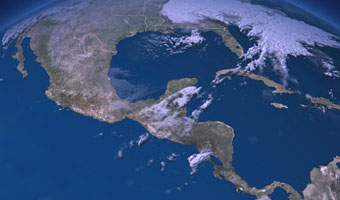Investment, Equality and Insertion are the Foundations for Economic Recovery in Central America


Hugo Beteta, who assumed as Director of ECLAC’s Subregional Headquarters in Mexico on August 24, refers to the challenges faced by Central American nations.
When and how will Central America leave the crisis behind? What should be the post-crisis agenda?
This is deeply determined by the velocity and type of recovery in the United States, which is the region’s main trade partner, as well as by the velocity and type of public policy decisions made in the different countries. This poses a challenge in terms of how to design a strategy to come out of the crisis that is compatible with a new vision of development for the region. In a few words, this means investment, equality and insertion.
Investment in the region is low but it is needed in order to resume a path of growth, because it is easier to have maneuvering room for public policies in a context of growth than in its absence. That’s why increasing levels of investment, both public and private, is necessary.
I think at this point, Central America should reconsider the role of public investment. National public investment systems are in need of reform and public-private partnerships should be boosted. Countries must also start discussing a regional agreement to generate public resources for investment in integrated infrastructure.
Moreover, private investment should retake the opportunities for attracting capital provided by the DR-CAFTA. Everyone knows that the United States is not going to create new free trade agreements, and I believe there may be Latin American capital interested in the denomination of origin of these countries in order to access the United States market once it recovers.
It would also be important to reconsider relations with Southeast Asia, not just as a source of trade, but also as a source of investment: look towards the Pacific and towards the diversification of business with India and China.
As for equality, it is very important to focus public spending on the poorest and social protection, given the crisis. It is important to ensure quality in public spending, to make it more progressive and to guarantee the foundations of legitimacy of the democratic political system and an open economic system. ECLAC’s proposal of making social security universal can help reduce informality and make labor markets function better in terms of reducing poverty.
Lastly, a strategy for insertion. Open integration creates the scale needed to think about domestic markets. China, India and Brazil have reminded us of the importance of endogenous technological efforts, qualified human resources and support for internal markets so domestic companies achieve scale at a time when trade is low.
Central America should represent an intelligent strategy for global insertion based on its biodiversity, the richness of its live cultures and its location. It is possible to develop low-carbon logistics networks. Countries should seek economic insertion in this “Capitalism 3.0”, an inclusive capitalism, though obviously with a strong presence of the State creating the conditions for a more modern private sector, of global quality, but where it also helps create, regulate, stabilize and legitimize markets, as Dani Rodrik reminds us.
Honduras’s constitutional regime was recently overturned. What does this mean for the future of a region that came out of armed conflict only 13 years ago?
First of all, it means the absence of an important member of the region. This has decelerated the integration process that had recently taken on more momentum. The Honduran crisis has shown that if one of the pieces is missing, the whole system is affected.
In terms of the economy, the impact has been considerable. Trade has been seriously affected, because goods in transit from the north of Central America (Guatemala, Belize and El Salvador) necessarily pass through Honduras. The economic costs Honduras is suffering are evident, but so are the ones Guatemala, El Salvador and Nicaragua are undergoing due to the alteration of trade flows in the subregion.
I believe it is very important to be aware of the rising regionalization of corporate groups, which are acting increasingly in an integrated and regional fashion, making the political decisions that one country makes affect the whole group, present in other countries of the region.
For more information see www.cepal.org/en/headquarters-and-offices/eclac-mexico











